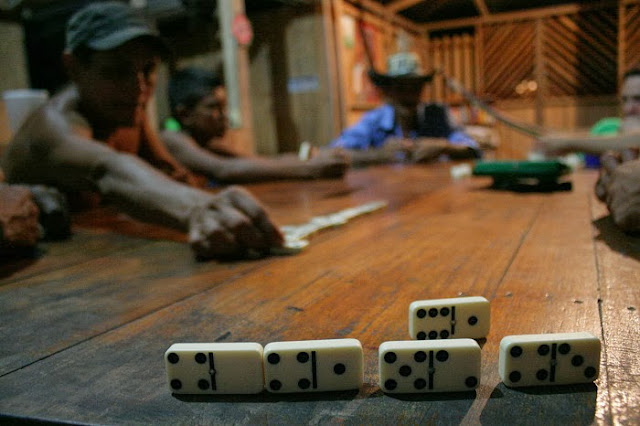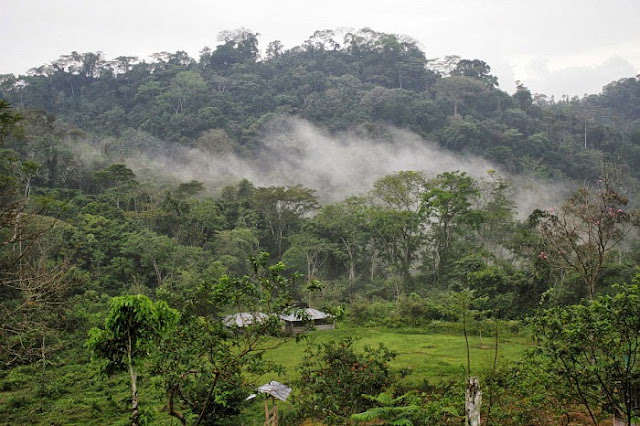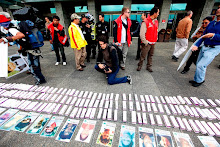By
Agustín Fernández (text and pictures).
Chronicle
published in the June issue of SeisGrados Magazine.
Returning
to Colombia three years later, to the Peace Community of San José de
Apartadó, to continue telling a story of the Colombian conflict from
the victims’ perspective. Victims that propose a way out and have
organized themselves to live in peace, even if their own lives are
the price to pay. Farmers that sow, so the next generation will be
able to harvest.
The Peace Community of San José de
Apartadó
A
recent report from the Internal Displacement Monitoring Centre (IDMC)
places Colombia as the country with the largest internally displaced
population worldwide: between 4.9 and 5.5 million people (230.000 of
them in 2012) have been compelled to abandon their homes due to
violence, most of them being farmers and natives forced to leave
their lands. The solution many communities have found to remain in
their territories is to adhere to the principle of distinction in
International Humanitarian Law, creating humanitarian zones, and
claiming for every side to acknowledge their condition as civil
population, not involved in the armed conflict. An example of this is
the Peace Community of San José de Apartadó, formed by over 1.200
farmers that have been trying to survive resisting the conflict for
over 16 years now, in one of the most violent zones in Colombia:
Urabá Antioquia. Since its foundation, the Community has undergone
economical blocks, forced displacements, threats, violations and over
190 homicides committed by the army, the paramilitary and the
guerrilla.
“Seven
dominoes of each number, of number 3, four have already been played
and I have two, so if anyone plays the remaining one I’ll have
everyone passing, even my partner, but well, I’ll do it for the
team’s sake”,
I thought, in an attempt of creating my strategy to win this domino
hand. I never thought such simple rules would make for such a
complicated game, but there I was indeed, attempting to anticipate
the next move, in order to be the first one left without tiles. Tinto
(black coffee) and dominoes night in San Josesito. Alcohol does not
exist in the Peace Community, as the internal regulations dictate its
prohibition within its territories (this is also the case with
cultivating coca, carrying weapons or collaborating with any of the
armed sides). My game partner was Jesús Emilio, one of the main
leaders in the Community, and its legal representative up until the
beginning of the year. White tank top, wide hat, thin moustache and
brown eyes that concentrated not only in the dominoes played by
everyone else, but also in each player’s reaction, trying to get a
lead from them as well. In the three years I have known him, Jesús
Emilio has escaped two murder attempts. The last one was in February
2012, when two paramilitary members shot at him from a motorbike in
the middle of the market plaza in Apartadó, a nearby town. Jesús
Emilio managed to escape unharmed. “God
wants me around for a bit longer”,
he said to me more than once.
The
opposite team was formed by Mr. Aníbal, a 74 year old farmer and
member of the Peace Community since its foundation in 1997; and
Cecile, a 25 year old French volunteer for the NGO Peace Brigades
International. Cecile’s presence, along with a German volunteer
that chose reading over domino, was the result of a request made by
the Community to the NGO, so that they would join a work group that
would leave San Josesito the following day, headed to Arenas Altas.
The incursions made by the paramilitary in Arenas Altas had displaced
almost every inhabitant towards other towns within the Community, so
the objective of the work group was to clean the paths of access,
harvest the beans, trim the cacao trees and prepare the zone, to
ensure the residents (who own those lands) would gradually be able to
return. It was a risky trip, more so considering Jesús Emilio’s
presence among the participants, which is why the collaboration of
the Peace Brigades International was necessary. The task this NGO
conducts is basically one of international observation, “being
present”, testifying. Before accompanying Human Rights defenders,
farmers or natives being chased, members of Brigades notify
embassies, police and the army about the zones they will be visiting.
In words of the farmers themselves, “when
you join the guys from Brigadas, the paramilitary are nowhere to be
seen, but when you go alone...”.
Even
though it was time for bed, dominoes was still on. Time for Jesús
Emilio to make his move, who watching the dominoes played says to me:
“Should
I wrap this up? Should I wrap this up and we win?”
Before I was able to reply, he did it for himself: “I
will wrap this up so we win, Cecile has the double 5, so we will
collect a lot of points...”.
He placed the 4-2 dominoe, which was the last 2, so 2 was on both
ends. It was impossible to carry on, the game was over. Jesús Emilio
was the player with less points, he was left with the 3-1; Cecile was
left with the double 5 and the 4-1. “How
come you knew I had the double 5?”
Cecile asked Jesús Emilio, then she added: “Did
you see my dominoes?”.
Jesús Emilio smiled enigmatically and taking his index finger to his
temple replied: “It’s
the reiki, the reiki, that’s why I’m the dominoes master”.
The game was over, and off we were to bed, knowing that we faced a
three-hour walk to Arenas Altas the following day.
The
idea was to leave in the morning, but getting the mules ready took
longer than expected, so we ended up departing after lunch. The
travelling group was formed by Jesús Emilio, Orlando, Alberto,
William, Orfidia a.k.a. “La Gorda”, the two Brigades volunteers
and me. Once we reached Arenas Altas, John Freddy a.k.a. “Bananito”,
coordinator of that zone, and some youngsters that were travelling
the following day would join us.
Mud,
stones, mud, stones, mud, mud and more mud, that would be the
accurate description of the path we took from San Josesito to Arenas
Altas. To that we should add a couple of narrow passes and the fact
that the whole walk was upwards. Two hours into our journey and I
could already count my pulse without using my fingers. A line from a
song by Mateo and Cabrera was repeating in my head “Hearts
that explode from pumping so hard”.
Lucky for us, we reached a glade called Pela Huevos, where we got to
rest for a few minutes. All it took to understand the name (Spanish
for “Egg Peeler”) was a look at the floor, covered in eggshells.
Residents from the area usually stop at the glade for resting, and
hard boiled eggs are easy to carry around. It is also a spot the
paramilitary tends to choose for vigilance. Fortunately, or perhaps
due to the presence of Brigades, we did not come across a single
paramilitary member during our three-hour walk.
We
finally reached Arenas Altas, a valley amidst mountains, with no more
than ten houses and a small school. We settled in an abandoned house
located in one of the higher parts. The Brigades volunteers hanged
their flags on the front right away, and hoisted the flag of the
organization on a long cane, so it would be seen from far away. The
house had soil floors and two rooms, I ended up sleeping in a hammock
in the “living room-kitchen” with Cecile and Mauritz, the German.
The rest of the group would sleep in the room or the eaves.
Orfidia
lived in Arenas Altas until last year, when she decided to moved to
San Josesito threatened by the paramilitary and the possibility of
them recruiting Joaquín, her teenage son. From the eave of the house
we shared, she kept me up to date with the reality of the town.
“There
used to be 15 families here, some others lived farther away;
nowadays, the only one living here is Mr. Filimón, he lives in that
house down there.”
Mr.
Filimón’s house was quite similar to “ours”. Wooden walls,
earthen floors, tin ceiling. I found him having lunch, sitting in the
kitchen behind a hammock, guarded by a pair of dogs waiting for the
leftovers. “The
last time the paracos (local slung for “paramilitary”) were
around, they stayed at the same house you are now”,
he commented while having rice with yucca and meat. “I
was walking nearby, carrying some sticks for the kitchen, when one of
them said to me ‘Nice to shoot a bullet to this old man!’ and I
looked at them and told them to do it.”
Filimón
is 73 years old, and had two sons that were murdered by the army. His
wife “got
bored of me a while ago and left”.
When questioned about his daily life he responded: “I
work to keep moving, but I’m getting old”.
I asked him what would he do if the paramilitary returned to the
area, to which he answered, without a doubt, that he would move to
another sidewalk of the Peace Community.
The
first couple of days at Arenas Altas were spent in the trimming of
the cacao trees, an essential task since the Community exports
certified organic cacao and is often visited by surprise
supervisions. Then, the cleaning of the path to Arenas Altas began,
and that was when the ride got rocky. Firstly, because we came across
a beehive of African bees. Alberto told us to remain quiet as we
picked up the pace. Some bees caught up with us, and one of them
stung my left arm. It hurt awhile, but it was not a big deal. On our
way back, we had to go through the forest to avoid encountering the
bees again. “Together, they have killed cattle” said Alberto,
noticing my skepticism towards the power these immigrant bees really
have. Leaving the path and shortening the way through the forest did
save us from the bees, yes, but it presented us with a whole new set
of risks. I have never been so obedient like when they said: “You
will step only where I step, ok?”.
We were in an area of frequent paramilitary-guerrilla confrontation,
so there was a possibility of land-mines lying around; therefore, no
stepping away from the path cleared by the leader.
We
were finally able to make our way back to the path without a problem,
when, as we approached a narrow pass, Bananito proposed a detour. He
wanted to show us a spot where after the paramilitary and the
guerilla fought, two bodies of the paramilitary were left unclaimed
for several days. The year was 2011. The Community witnessed the
moment when a group from the paramilitary, along with the army, went
through the area in a helicopter, but did not actually retrieve the
bodies. After repeated complaints before the Office of the Ombudsman,
which denied the existence of bodies in the area, the Community
decided to put together a delegation with the task of retrieving them
and taking them to San José, where their disappearance had been
reported by relatives. In a press release from that time, the
Community explains its decision as follows: “A
lot of people do not know us; he who has not walked with us wonders
how is it possible that these paramilitary that have threatened us,
that have pushed us away from our lands, are now being treated in a
humanitarian way by us, to the point that we are now picking up their
bodies to make sure they are buried in at least a dignified manner.
Considering the criteria of the Death and Inhumanity System that
surrounds us, this is not understandable. Our society is mainly ruled
by the ‘an eye for an eye and a tooth for a tooth’ policy. Our
presidents encourage us, through their speech, to engage on a revenge
against rebellion, by using chilling words of brutality. But we do
not share those principles. Our fight for justice is completely
foreign and contrary to any sentiment of revenge. We demand justice;
we say NO to armed parties; we demand respect from them; we do not
give in to their demands; we do not step back when they threaten us
or before their displays of cruelty. They certainly generate fear and
strong pain through their criminal behavior, but what they have never
managed to accomplish and never will, is to create hate. [...] We
believe in the dignity of any human being above any war, and that is
why we opted for our Community. [...]”.
Traces
of the combat still remained at the place, bullet holes in rocks,
paramilitary clothing lying around, a rain boot with a bullet hole.
To picture in my mind the state of those bodies after being abandoned
in the forest for 10 days, was quite complicated. None of the members
of the group felt comfortable in that spot, so we resumed our walk
back to Arenas Altas after a few pictures.
Back
at the house, Orfidia had already prepared dinner: rice with beans,
fried eggs and salad, a very similar menu to breakfast and lunch. It
would be impossible to endure heat, humidity and physical exhaustion
if having breakfast the Uruguayan way, toasts and coffee with milk,
maybe mate, so I had to get used to hyper-caloric breakfasts. Like
every afternoon in Arenas Altas, it was time for dominoes. I teamed
up with Alberto, against Cecile and Jesús Emilio. Don Filimón, who
swung by to chat but refused to play, observed this hand attentively
as he spoke to those waiting for their turn. As time went by, the sun
set and the lanterns lit up, the lessons Cecile had taken with Jesús
Emilio became more evident. We were being thrashed, 93 to 15, they
were seven points away from defeating us. We could not get distracted
even for a second, we had to keep in mind exactly which dominoe we
would play next, and try to figure out their strategy before they
guessed ours. There was a chance that we would have a stroke of luck
and get five double dominoes at once and the hand would be done right
there, we would count the opposite points and probably win the game
that easily. I began picking up my dominoes, to find some doubles
among them, double 4, double 5, double 1 and double 2. I had only one
domino left to pick, if it was another double, the game was over and
we had won, otherwise, it was a very tough hand to win (it is very
difficult to win the game over with only four doubles). The emotion
was high, but I had to put on my best pokerface and disguise the
nerves of picking up that last domino. It ended up being 5-2.
Disillusion had me playing that last hand when I had already given
up; we lost fairly, guess you can’t win’em all. Mr. Filimón
smiled, although his face was saddened with the news of our return to
San Josesito the following day. “I
am alone here again”,
he said, “you
will be missed”.
“But
we will be back after the end of the week, Mr. Filimon”,
Jesús Emilio replied, “there
is a lot of work left to be done around here”.
It was already late in farmer’s schedule, and we had a three hour
walk to San Josesito ahead of us early in the morning, so it was time
for everyone to hit the hammocks.







